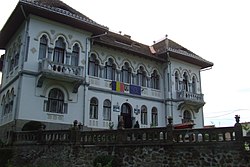Săliște
Sălişte | |
|---|---|
Town | |
 The City Hall | |
| Country | |
| County | Sibiu County |
| Status | Town |
| Government | |
| • Mayor | Teodor Dumitru Banciu (National Liberal Party) |
| Area | |
| • Total | 226.78 km2 (87.56 sq mi) |
| Population (2002) | |
| • Total | 6,092 |
| Time zone | UTC+2 (EET) |
| • Summer (DST) | UTC+3 (EEST) |
| Website | http://www.saliste-sibiu.ro/ |
Sălişte (German: Großendorf or Selischte; Hungarian: Szelistye) is a town in Sibiu County in the centre of Romania, 21 km west of the county capital, Sibiu, the main locality in the Mărginimea Sibiului area.
Geography
The town is situated at the edge of the Cândrel Mountains, on a series of river valleys which flow into the Cibin River in the South part of the Transylvanian Plateau. According to the Sălişte City Hall website, besides the main town of Sălişte (with a poulation of 2,830), under the same administration are also the following villages:
- Aciliu (268 inhabitants), 8 km away
- Amnaş (Hungarian: Omlás; German: Hamlesch) - (369 inhabitants), 9 km away
- Crinţ (2 permanent inhabitants - military base), 18 km away
- Fântânele (also known as Cacova Sibiului, Hungarian: Szebenkákova) - 251 inhabitants, 8 km away
- Galeş(Hungarian: Szebengálos; German: Gallusdorf) - 331 inhabitants, 2 km away
- Mag (439 inhabitants), 9 km away
- Săcel (520 inhabitants), 4 km away
- Sibiel (Hungarian: Szibiel) - 402 inhabitants, 6 km away
- Vale (Hungarian: Vále) - 384 inhabitants, 2 km away
Population
Originally all the localities, except the villages of Aciliu and Amnaş, were inhabited by Romanians. Today the ethnic composition is as follows:
- 5,725 - Romanians
- 233 - Romas
- 137 - Germans
- 7 - Hungarians
Most Romanians are Orthodox and the Germans still living in Aciliu and Amnaş are Lutheran Evangelical. There are also some small Protestant Churches.
Economy
Traditionally the main occupation was shepherding and related activities. Today this occupies a smaller percentage of the workforce, but remains important alongside other agricultural activities. Light industry was developed in the recent period and there are some textile workshops. Commerce and services are also an important activity. The area around Aciliu and Amnaş is well suited for wines and around Mag and Săcel there are a series of artificial lakes for fish farming.
History
The area was inhabited for a very long time, and on a hill between Sălişte and the nearby commune of Tilişca there are the ruins of an old Dacian citadel. The first document mentioning the town is from 1354 and refers, in Latin, to Magna Villa. Early names would be Nogfalu in Hungarian and Grossdorf in German. Later, in 1383 the village is known as Magna Villa Valachiealis (Big Village of the Vlachs), denoting its ethnically Romanian population. Still later, it was one of the villages in the Ţara Almaşului, an area sometimes ruled by Wallachian rulers.
Around 1485 it was included in one of the seven seats of Saxondom. In the late 18th century Sălişte became an important village of the Romanian community and the most important cultural centre in the Mărginimea Sibiului area. In 1774 an important local revolt of the Romanian population took place; members of this community also participated in the the revolution of 1848, the Transylvanian Memorandum movement and almost every important event in the National awakening of the Romanians in Transylvania.
Personalities
The most notable personalities born in Sălişte town are:
- Axente Banciu (1875–1959), Romanian academic
- Ioan din Galeş - Confessor priest, celebrated on the Feast Day of October 21st
- Onisifor Ghibu (1883–1972), teacher, organiser of the Romanian educational system in Transylvania
- Ioan Lupaş (1880–1967), Romanian historian
- Dionisie Romano (1806–1873), Bishop of Buzău, theologian and writer
- Dumitru D. Roşca (1895–1980), Romanian philosopher
Image gallery
-
The beautiful village of Galeş nestled in the foothills of the Cindrel Mountains
-
The village church of Galeş
-
A typical village street - the approach to the Church
-
A small church and nun's retreat, situated along a wonderful woodland walk up the side of the valley. (It can be reached by following a path up the side of the hill at the well which is the boundary point separating Galeş from neighbouring Sălişte)
-
The nun's housing
-
A colourful local resident
-
A typical village house facade
-
Example of village pargeting on a house facade in the centre of the village









